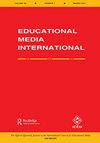COVID-19大流行期间特殊教育中英语学习者的比例过高
IF 1.4
Q2 EDUCATION & EDUCATIONAL RESEARCH
引用次数: 3
摘要
英语学习者(el)在特殊教育中的比例过高的持续担忧,加上2020年全球COVID-19大流行促使教育工作者加大在线教学,迫使教育工作者通过电子学习向el提供教学。美国学生在外语能力方面继续落后于其他国家的同龄人,这进一步加剧了这一问题。在提高英语学习者的词汇习得能力方面,美国可以从其他国家获得有价值的见解,因为学习新词汇是英语学习者提高英语水平的关键。通过对八项国际研究的回顾,本文提出了以下有效的词汇习得策略(VAS): 1 .使用母语进行英语教学;(2)内容语言整合学习;(3)用第一语言和第二语言设计与文化相关的活动;(4)教学前多模态词汇外显学习策略;(5)多媒体的使用;(6)促进自律。本文还介绍了一种自我调节的多媒体认知学习模型,用于教育工作者在虚拟学习增强的时代使用ELs实施VAS。本文章由计算机程序翻译,如有差异,请以英文原文为准。
Overrepresentation of English Learners in Special Education Amid the COVID-19 Pandemic
ABSTRACT The continued concern of English Learners (ELs) being overrepresented in special education coupled with the 2020 global COVID-19 pandemic that urged educators to ramp up online instruction, has left educators to deliver instruction to ELs via e-learning. This issue is further exacerbated by students in the United States (U.S.) continuing to lag behind their peers in other countries in foreign language capabilities. The U.S. can gain valuable insights from other countries when it comes to boosting the vocabulary acquisition skills of ELs, as learning new vocabulary is key for ELs to develop English proficiency. This review of eight international studies indicated the following effective vocabulary acquisition strategies (VAS) feasible for instructing English learners via e-learning: (1) using the native language to teach English; (2) Content Language Integrated Learning; (3) designing culturally relevant activities in both the first and second language; (4) pre teaching vocabulary multimodally using explicit word learning strategies; (5) use of multimedia; and (6) promoting self-regulation. A Self-Regulated Multimedia Cognitive Learning Model for educators to implement VAS with ELs amid a time of enhanced virtual learning is also introduced.
求助全文
通过发布文献求助,成功后即可免费获取论文全文。
去求助
来源期刊

Educational Media International
EDUCATION & EDUCATIONAL RESEARCH-
CiteScore
3.20
自引率
0.00%
发文量
10
 求助内容:
求助内容: 应助结果提醒方式:
应助结果提醒方式:


